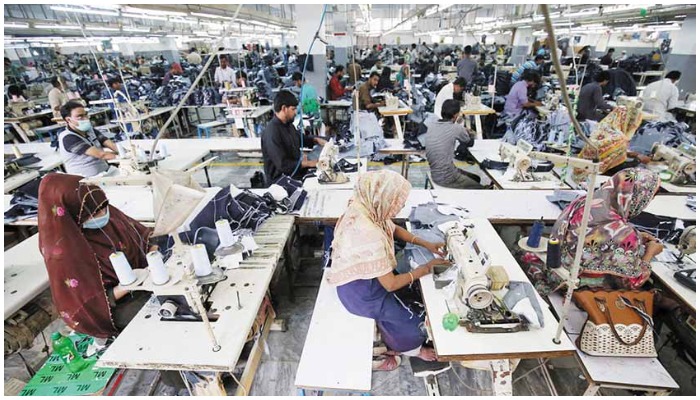SMEs: The engine of growth
Since last economic establishments' census was conducted in 2005, it is a pity that decisions have been made on non-credible data
December 28, 2021

Pakistan’s economic policies traditionally favour large scale manufacturing (LSM). LSM by its very nature is less job creating and relies, in Pakistan’s case, on imported industrial raw material, thus exacerbating the import bill. SMEs have remained unloved in-terms of government dole outs, tax breaks or even a cheerleading squad. Financing remains skewed towards large-scale industries or multinationals. At the end of June 2021, SME financing stood at a meagre Rs437.57 billion or just 6.57 percent of the total private sector credit in the country with only 172,893 SME borrowers. Statistics paint a dismal picture.
Resourceful lobbies with 78,000 large industrial units against the 5.2 million small guys continue to have the ear of policymakers, political leaders, financers and international industrial partners. The Small and Medium Enterprises Development Authority (SMEDA), the premier body for supporting SME development in the country, even after 23 years of its existence has made little dent to convince at some credible level the kind of impact SMEs have had in turning countries into real growth stories in Japan, South Korea, Italy, USA and Malaysia, to name a few. SMEDA continues to be a rather low voice with little if any credible research publications or success story to showcase SME integration into global value chains. At times led by bureaucrats to mid-tier professionals, the organisation leaves much to be desired.
Imagine a small welder trying to set up shop with meagre capital, of his own or borrowed from relatives or friends. The business is inundated by a regulatory regime that predicates on interacting with government agencies for licensing and compliance, dissuading SMEs from operating in the formal sector. Credible estimates of Pakistan’s informal economy date back to 2010 when a State Bank of Pakistan study put the informal economy at 30 percent of the formal sector. Informality is a key reason for: i) a low tax base; ii) a low tax-to-GDP of 10 percent; and iii) SMEs inability to provide documentation for borrowing from the banks. The above is a challenging picture. Any worthwhile change requires a herculean effort.
The first SME Policy for supporting SME growth in the country was approved in 2007 by the government, but hardly implemented in true form and substance. Monitoring and evaluation mechanism for the 2007 policy remained weak and required resources remained amiss. Lack of ownership also contributed towards weak implementation. It is a welcome step that after three and half years, the current government has put together a new SME Policy. It is hoped that the new policy considers the new global atmosphere of digital platforms of e-commerce, on-line payment gateways and internet of things.
Today, trade and transactions, information and nature of products and services stand completely disrupted with new technologies. The new envisaged policy prescriptions have to be convincing of a commitment to support a transition of SMEs based on these new realities. The Organisation for Economic Co-operation and Development has developed several benchmarking tools, the SME Policy Index being one, to assess and monitor SME policy frameworks across developing countries. It would be useful to assess the newly developed policy against this index for adopting good practices.
It is not hard to pen down the doables. Start with a census. Getting evidence is key to informed decision making. We need a mechanism to assess the growth of SMEs on a periodic basis to give us a snapshot of key SME statistics. That’s the first step – capturing data to get it right. Two, wherewithal of both the federal apparatus, SMEDA, the four provinces and Gilgit-Baltistan, with the kind of engagement as is in the case of large-scale industry will be necessary for SMEs to have a real voice. This engagement requires day in and day out effort.
Three, a comprehensive, well-coordinated institutional effort will lead to a transformational change of the SME landscape in the country; the guiding principles include rectifying market failures arising from externalities and information asymmetries, with the existing government institutional infrastructure coming together through support programmes in their specific areas of expertise. Similarly, focusing interventions towards enhancing domestic productivity of SMEs through access to varied business development services, testing services, export readiness programmes, international standards certifications and technical skills can enable SMEs to grow and integrate in global value chains. It is hoped that the new policy makes a considerable effort in this regard.
Four, supporting new enterprise creation and firms graduating to higher levels of growth, in terms of size and scale is crucial. For Pakistan to truly be able to jump the curve, building an entrepreneurial ecosystem, supportive of innovative ventures is imperative. Growth enterprises must be the country’s key focus. Pakistan’s start-up ecosystem has become increasingly active in the past decade. There is a substantial increase in awareness, interest and investment from both international and domestic stakeholders, with institutional players including government organizations, academic institutions, venture capital funds and incubation and accelerators actively engaging with innovative start-ups.
Technology/ process automation-based sectors provide a better value proposition to venture capitalists – and therefore sectors such as agri-tech, health-tech, eCommerce, logistics and transportation, and fin-tech have increasingly received interest from international investors. Venture Capital (VC) funding has experienced some growth from $80.9 million in 2015 to close to $300 million in 2021. However, funding has been mostly through VC funds incorporated abroad. This indicates the need for developing the regulatory regime where local VC funds can be set-up to mobilise domestic investment.
Bravery is needed for a big reform agenda of transforming millions of SMEs to become the engine of growth for the country. It is time SME development was pursued with a tunnel vision precision for real impact.
The writer is former adviser, Ministry of Finance. He tweets @KhaqanNajeeb. Email: [email protected]
Originally published in The News











